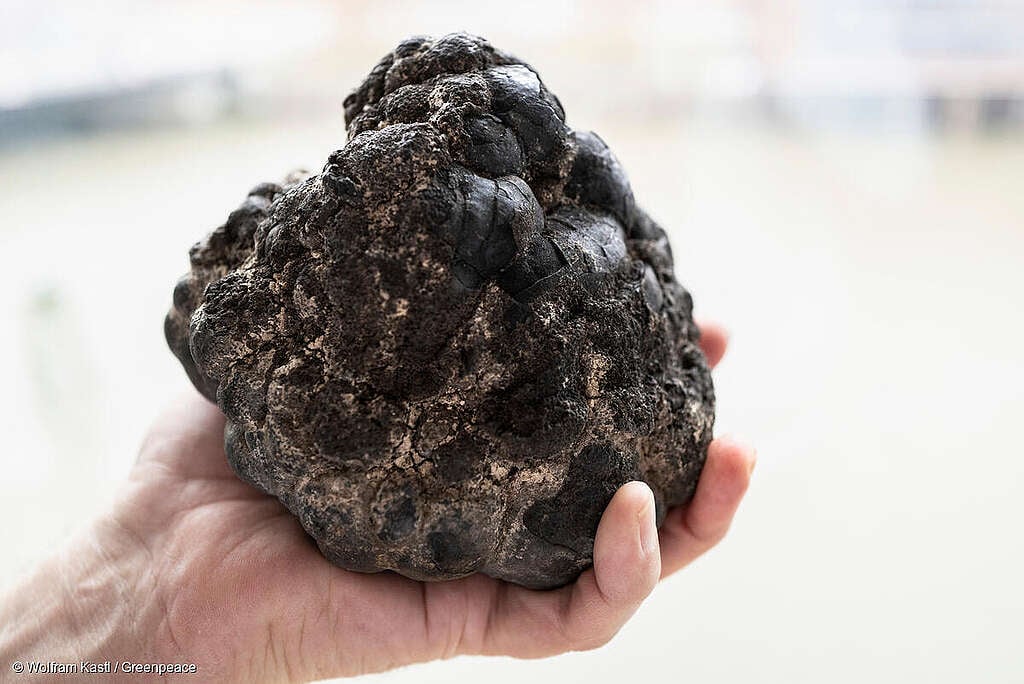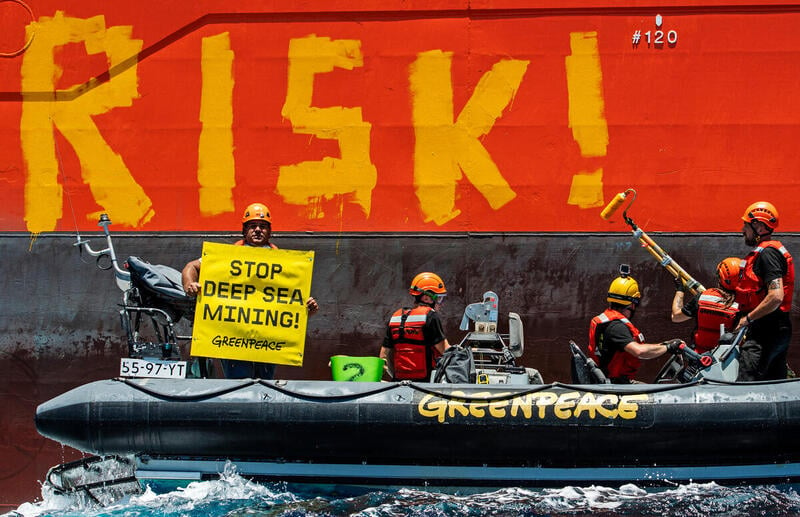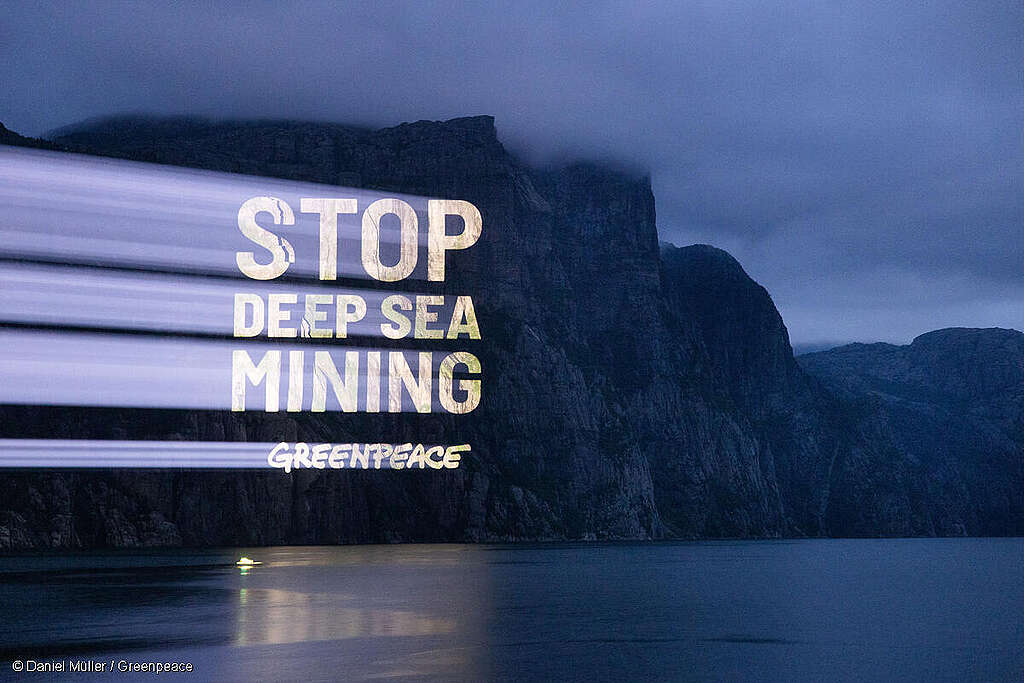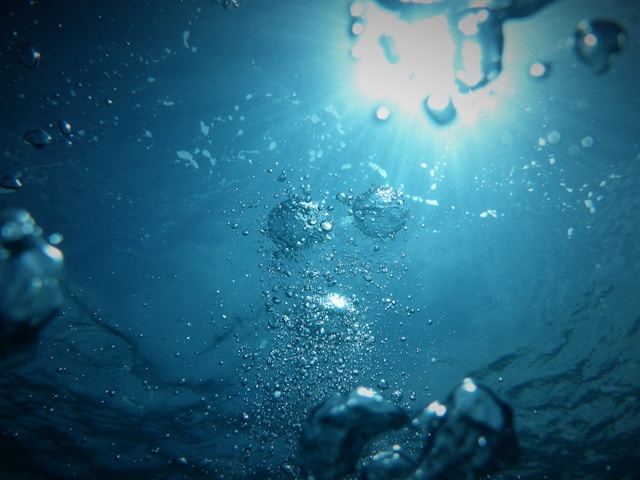Nick Young 26 July 2024 / Greenpeace Scientists have found a source of ‘dark oxygen’ 4,000 meters below the surface of the Pacific in the target zone for deep sea mining. The discovery could have far-reaching implications for science and the wannabe deep sea mining industry. It’s often said that we know more about the surface of the moon than we do about the deep ocean. This new discovery of dark oxygen shows how true that is, and underlines the need to stop a new deep sea mining industry from targeting its source.
What is dark oxygen?
What scientists mean by ‘dark oxygen’ is that – in the total darkness of the very deep ocean – around 4,000 meters below the surface of the Pacific Ocean – oxygen is being produced – in the dark.
It’s previously been thought that oxygen on Earth is produced on land and at the surface of the ocean, where sunlight makes plant photosynthesis possible.
Plants on land are the biggest producers of oxygen, but marine algae and phytoplankton also produce it. These microscopic organisms perform photosynthesis in the ocean, which covers about 70% of the Earth’s surface.
Blue-green algae – or cyanobacteria – are some of the oldest organisms on Earth and can also produce oxygen. They were among the first to do so through photosynthesis, and they also need sunlight.
The common factor in oxygen production is sunlight – until this discovery of dark oxygen showed that oxygen is also being produced in another way in the deep dark sea.
Why is the dark oxygen discovery significant?
The dark oxygen discovery is being hailed as a groundbreaking scientific discovery, but it also has other implications.
Nick Owens, the director of the Scottish Association for Marine Science (SAMS) says: “The fact that we’ve got another source of oxygen on the planet other than photosynthesis has consequences and implications that are utterly profound.”
Andrew Sweetman, who was one of the SAMS scientists involved in the research, says in a video: “This research potentially sheds light on where life began on the planet. This discovery has shown that, well, maybe there was another source of oxygen a long time ago and aerobic life or life that breathes oxygen could have persisted before the rise of photosynthesis — and if it’s happening on our planet could it be happening on other planets too?”
But as well as those wider implications, the discovery has significant and immediate implications for the controversial deep sea mining industry which somewhat ironically sponsored the science.
Here’s the thing. This dark oxygen, instead of being produced by plants and sunlight, is being produced by strange potato-shaped metallic lumps found on the deep sea floor.
It turns out that these lumps – otherwise known as ‘polymetallic nodules’ – give off almost as much electricity as AA batteries! By reacting with salt water, their electrical charge produces oxygen way down there on the seabed of the deep ocean through a process known as ‘seawater electrolysis’ which splits seawater into hydrogen and oxygen.

So, these little metallic lumps, which the wannabe deep sea miners have been metaphorically calling ‘batteries in a rock’ actually turned out to be just that – and they’re producing dark oxygen that could play a critical role in the deep ocean ecology.
What the dark oxygen discovery means for deep sea mining
The discovery of metallic nodules producing dark oxygen has been a huge surprise to science which could even require a new way of thinking about how life first began on planet Earth.
But it could also be the final straw in the case against deep sea mining. It could stop the industry before they begin.
The discovery was made in the Clarion-Clipperton Zone (CCZ), a huge flat area of the seafloor that stretches between Hawaii and Mexico, where mining companies like The Metals Company have plans to start harvesting these very same nodules that turn out to be producing all this dark oxygen.
These oxygen-producing nodules could be supporting a whole range of known and unknown deep sea lifeforms. Dark oxygen could be a critical factor in the deep sea ecosystem!

Greenpeace and others have long said that this new extractive mining industry should not be allowed to start in the very deep ocean because the life there is so little understood, and the ecosystems are fragile and potentially vital for the health of the ocean and all life on Earth.
This new discovery underlines the point.
The timing is good because world governments are meeting in Jamaica right now to decide the fate of this new mining industry. They’ll be deciding whether or not to allow deep sea miners like The Metals Company to go ahead with their plans to drop giant mining robots onto the seafloor to start harvesting these life-sustaining nodules.
Greenpeace is in Jamaica arguing strongly that deep sea mining should not be allowed to go ahead – especially now that we know the deep ocean is another source of oxygen that could be vital for the health of the ocean and all of us who depend on it.
In the climate and biodiversity crisis, we know that nature, in all its diversity, must be protected.

PETITION: Stop Deep Sea Mining
An emerging new industry could destroy this fragile and unique deep sea environment before we truly understand its importance.
Photo by Jong Marshes on Unsplash
For more information contact Deep Sea Defenders.


The science in this Greenpeace press release is flawed. Plants, both terrestrrial and marine, are not the most important source of oxygen on this planet. Oxygen is released from water vapor in the atmosphere when it is hit by cosmic rays. That is the largest single source of oxygen and marine plants–plankton–are second, with land-based plant life in third place.
Destruction of plankton has been happening for years due to over-fishing. The humans have eaten most of the big fish in the oceans. Big fish eat little fish. Little fish eat plankton. So with fewer big fish there will be more little fish, and therefore, less plankton.
http://www.fisherycrisis.com/CO2/strangelove2.htm
I agree with the efforts to prevent exploitation of the ocean deeps, but Greenpeace sold out long ago and I do not regard Greenpeace as a reliable source of scientific information.
All mining everywhere should be ended for multiple reasons, starting with the fact that humans should not be digging into the Earth, either on terrestrial land or in the oceans. But hey, if this new information can be used to stop deep sea mining, so much the better.